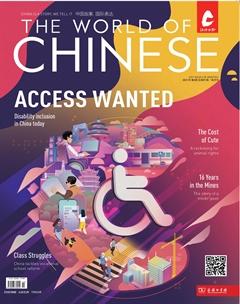On the Character: 通

A character that connects the universal
万物相通,世界大同
According to scholar Tao Yuanming (陶渊明), the path to paradise is hard to find. In his essay “The Peach Blossom Spring” (《桃花源记》) in 421, Tao wrote of a lost fisherman who found it by sailing along an unfrequented stream into a small cave opening in a peach forest: “The opening is narrow and only one person may pass (初极狭,才通人chūjíxiá, cáitōngrén).”
Once through the entrance, though, the fisherman found fertile farmland, beautiful natural scenery, and happy people both young and old. There were “paths intersecting the fields in all directions, and roosters crowing and dogs barking (阡陌交通,鸡犬相闻qiānmòjiāotōng, jīquǎnxiāngwén).”
In contrast to this utopia, the real world was mired in strife at the time Tao was writing, as the violent fall of the Jin dynasty (265 – 420) threw the empire into over a century of civil war and invasions from northern tribes. Perhaps its appropriate that the character 通 (tōng, access; unimpeded; to pass) appears several times in the text—amid such turbulence in the real world, even freedom of movement and unimpeded roads can seem like a luxury.
The character 通 first appeared over 3,000 years ago in oracle bone inscriptions, comprising a “walk (彳chì)” radical on the left, which represents its meaning, and a “use (用yòng)” component on the right, which indicates its pronunciation. In some historical texts, an extra “foot” radical was added below the previous formation to emphasize the meaning of “walking.”
According to the 2,000-year-oldAnalytical Dictionary of Chinese Characters(《說文解字》), 通 means “arrival (达dá).” In 655 BCE, when Chonger (重耳), a prince of the Jin state, was prosecuted and forced to flee his home land, one of his counselors opposed the idea of seeking refuge in states Qi and Chu, which are “far away and hard to reach (道远难通dàoyuǎn nán tōng),” according to the historical text Discourse of the States(《国语》).
Later, the character extended to indicate movement and unimpeded access. Any passageway or road can be referred to as a通道 (tōngdào), and a vent to allow air to circulate is called a 通风口 (tōngfēngkǒu). To pass or go through a location is called 通行 (tōngxíng).
To describe a place with well-developed transportation (交通jiāotōng) or that is easy to access, the idiom 四通八达 (sìtōngbādá, literally “four throughs and eight arrivals”), meaning “extending in all directions,” is often used. A place described in this way is often well-connected with other locations in various ways, including by 通航 (tōngháng, water or air transport), 通邮 (tōngyóu, postal communication), and 通商 (tōngshāng, having trade relations).
The meaning of 通 has also expanded to include communication. For instance, the phrase 溝通南北的铁路 (gōutōngnánběi de tiělù, railway connecting the south and north) is used to indicate physical transport links, but the term 沟通 (gōutōng) now also means to exchange ideas and information, as in 沟通感情 (gōutōngǎnqíng, cultivating friendship). To inform someone of some knowledge is 通知 (tōngzhī), and to make an announcement is 通报 (tōngbào).
The character also represents a command of knowledge or skills: either mastery (精通jīngtōng), rough knowledge (粗通cūtōng), or utter ignorance (一窍不通yíqiàobùtōng). Traditional Chinese etiquette, though, emphasizes modesty, so a world-famous architect might say, “我粗通建筑艺术 (Wǒcūtōngjiànzhùyìshù, I know just a little about architecture).”
通 can also be a noun, awarded to a person who has gained mastery over an area of study, such as 中国通 (zhōngguótōng, China expert) and 万事通 (wànshìtōng, jack-of-all-trades). By contrast, members of the general public who have no outstanding characteristics are known as 普通人 (pǔtōngrén, ordinary or common person). This label, though, often excludes people with disabilities, who need special public services, such as special education.
Amid frequent reports about the struggle of people with disabilities to get access to public services, including blocking of handicapped-access lanes and guide dogs being denied boarding on public transport, it may still take some time for Chinese cities to realize the often seen slogan for inclusivity, “All roads lead to happiness (条条大路通幸福Tiáotiáodàlùtōngxìngfú).”
– Huang Weijia (黄伟嘉) and Tan Yunfei (谭云飞)
Illustration Design and Painting by Cai Tao and Wang Siqi
 汉语世界(The World of Chinese)2021年6期
汉语世界(The World of Chinese)2021年6期
- 汉语世界(The World of Chinese)的其它文章
- Balcony
- Gimme Sugar
- Access Wanted
- Class Struggles
- The Cost of Cute
- 学汉语
